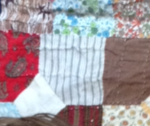 Daddy used to say, “Ooowee, Lola, Buddy made that horn talk!” My daddy called my brother Buddy and almost everyone else called my brother “Butch.” Although my brother answered to at least two nicknames, the name Mama gave him was Charles which made my brother a junior. People called my brother “Cooper, Jr” in order to distinguish him from Daddy. Butch and Daddy didn’t look just alike, but but they had very similar names and very similar professional paths. It made sense that the folks added “Junior” to my brother’s name when they spoke about him.
Daddy used to say, “Ooowee, Lola, Buddy made that horn talk!” My daddy called my brother Buddy and almost everyone else called my brother “Butch.” Although my brother answered to at least two nicknames, the name Mama gave him was Charles which made my brother a junior. People called my brother “Cooper, Jr” in order to distinguish him from Daddy. Butch and Daddy didn’t look just alike, but but they had very similar names and very similar professional paths. It made sense that the folks added “Junior” to my brother’s name when they spoke about him.
Butch and Daddy both graduated from Alabama State University in Montgomery, Alabama. My father played baseball there and my brother’s claim to fame was being the head drum major of the Marching Hornets in the late sixties. When Butch graduated from college, he went to work at a high school about thirty miles from Montgomery where Daddy was the vice principal. Daddy and Butch went to work at Autaugaville High School in 1970 to begin the process of integrating public schools in that rural Alabama county. Daddy had a master’s degree in administration, my brother had a bachelor’s degree in music, and their new principal had a degree in agriculture. In my opinion, their working relationship enhanced their relationship as father and son. In addition, they grew to respect each other as professionals working in a challenging environment. Daddy had the chance to mentor Butch as a young educator who wanted to use his gift of music to change the lives of the young people at the school.
Daddy was very proud of the fact that my brother was the first band director at the school. Daddy was also proud that my brother was well-prepared for the role of band director. Daddy supported my brother’s passion to be a musician from the time that Butch was a young boy. Butch, our sister, and me took piano lessons from the same piano teacher, Ms. Black. At some point, Ms. Black told my mother that Butch had a natural gift for music, but she didn’t think the piano was the instrument for him at that time in his life. Apparently, boys teased him about playing the piano so Daddy bought him a horn. As I recall, Daddy found someone in the neighborhood who had an alto saxophone for sale for $40. My dad paid the man ten dollars that day and gave the man the balance when he got paid. I really think my brother used that horn to get him out of years of chores like cutting grass, making beds, and doing laundry. Daddy often boasted that he made the statement that, “As long as Butch was practicing that horn, I would support him.” (Let me just say that by the time I came along the level of expectation changed and practicing a horn was not enough to eliminate a chore list.) Butch practiced, found his passion, and his voice through music. He loved music and invested himself in music to become one with everything that generated sounds. He became an amazing musician who blessed the world for many years with musical abilities. His first love was the alto saxophone, but his heart made room for many instruments over the years. He was not a classically trained musician, but his delivery was classic. He hit minor chords in a major way and the sax could make runs and scat like the best vocalists.
Mama, like Daddy, recognized the that the boy had talent so she would “invite” him to play or sing at every church program Old Ship A.M.E. Zion Church sponsored. Once the planning committees announced the themes and the dates of the annual events, Mama would call Butch and “ask” him to put the dates on his calendar. She made sure to tell him what selection she thought most appropriate for each event. Butch would oblige and the audiences were never disappointed. Most of the time he played a hymn my mother liked on his alto saxophone. When he had a pianist to accompany him, he would integrate smooth tenor vocals into the performance. In recent years, we have joked about him being the oldest kid slated for the church programs. He laughed about how Mama never saw it as odd that her really grown son was on the same program as the youngest members of the church family.
When I was in the seventh grade, I wanted to enroll in band class. Although I knew that he was a band director, it was then that I first appreciated how much he knew about musical instruments. I learned that he could play more than one instrument. He played the flute, the guitar, the saprano sax, the bongos, the keyboard, and all of those random percussion instruments I didn’t know had a function in a band. I began to understand the breadth of knowledge he had about music. I realized he was a master of music and that his commitment to the sound was deeper than the pitch or tone made by a person playing one instrument. He spoke about balance between the horns, woodwinds, and percussion and the need to produce a harmonious product for the audience. He was concerned about the details in the music and the heart of the musicians. Conversations with him about music turned the space into a laboratory and he was the head chemist in charge. Most of the time I didn’t really want to know the science behind the sound. I just wanted to hear the sound. My brother taught me to make the effort to hear the heart of the artist when I listened to music. Hanging out in his makeshift laboratories taught me to appreciate the ability of music to reach the heart of a human soul then influence emotions, thoughts, and actions. It seemed that his goal with every performance and in every composition was to create a moment that would allow his love of the music and his hope that the music would meet the heart of a listener and transfer his passion and the pureness of the spirit he invested into the sound. My brother loved the sound because it carried his expressive messages. He loved the fact that he could mix chords, blend instruments, write lyrics, and deliver all of it in a perfectly timed melody intented to empower folks to love the sound and be made alive because of the sound.
My brother was seventeen years old when I was born. He graduated from high school two months before I was born. He was old enough to be my father and that made for an interesting relationship between us. I looked to him to shelter me like a big brother, yet I hated it when he wanted to protect me like he was my dad. Because of the age gap, we never really lived in the same house so I looked forward to the announcement that he would be stopping by the house or to his surprise drop in visits. Because of the age gap, I didn’t have the privilege of hearing my brother play gigs anywhere except in the garage at the house when his band, the “I-85 Express” practiced. They would play hits from the rhythm and blues chart and the pop chart. One time he gave me the microphone and let me sing the female vocals with the band. That was cool and scary at the same time. Until then, I was used to him singing lead or leading family sing-a-longs. It was also common for him to sing happy birthday to family members on their special days. Once, when I was a freshman in college, he did the unexpected and he called me early one morning to sing Stevie Wonder’s song, “I Just Called To Say I Love You.” That was one of the sweetest things he had ever done. The funny part of the story was that he later admitted that he dialed the wrong number the first time he tried to call me and he woke up some girl down the hall from me. I loved that he called me “kiddo” and always wanted to know what I had going on in my world. He was the big brother who wanted to make me laugh. He aimed to impress upon me the need to own my intelligence and to think of myself as “pretty.” He would tell me that he was proud of me and end conversations with “love you girl” and his infamous “virtual hugs.”
My brother’s name became synonymous with music. He took pride in the science of the sound and he worked his craft with great discipline. He wanted his family, friends, and students to appreciate music beyond the notes on the page. He wanted his audiences to love the sound and appreciate the artistry and science that produced the sound. There were times when I just wanted the answer to the question, the short version of the tale from the band room, or for him to just sing the song, but got a lecture or demonstration to make a point about the methodology behind the tune. My brother believed that there was no substitute for hard work and that musicians should not make excuses when they fell short on reaching a task or goal. When he wasn’t playing, he was thinking about playing or arranging the next band drill. He stayed in planning mode orchestrating the next thing for the band he was directing, the church choir, or gig that was on his radar. My brother spent his time away from work working on music. I know that because he took me with him to the music store downtown to pick up instruments that he left to be repaired, to look at refurbished instruments that he could afford on the meager high school band budget, or to select sheet music for the upcoming marching or concert band performances. My brother loved music shops like my technically driven Daddy loved stores that sold picture tubes and radio parts. At the time, it seemed like his extra effort was too much and unnecessary. Now I know that without his extra effort some kid might never have had an instrument, his high school band would not have been invited to play at two NFL games, and a lot students would have missed out on college scholarships.
Butch expected excellence from himself as a musician and from musicians he performed with and those he taught. He led bands with pride and competence. He expected hard work, precision, and passion in performances. My brother has been fighting a good fight against a vicious opponent for about three years. He has fought gallantly and with resilience and pride. Even with chinks in his armor, he has continued to hold his ground and reestablish himself when his footing was challenged. I love my brother and the lessons he has transferred from his years as a musician to this life challenge. He has lived out one of the messages to his students over the years to never quit and to give your best in whatever you do. Recently, he told me that he continues to believe that he will “get better before [he] gets worse.” Even now, he has shown himself a resourceful leader who in the face of a challenge made a new way; he took new paths when needed to overcome the adversity in his life. In addition to the lessons on hard work, accountability, pride, passion, resilience, resourcefulness, and strength he has taught over the years, that statement taught me the benefit of believing in yourself and the mission and the benefit of maintaining a proper perspective while you show up to deal with whatever your challenge might be any given moment of any given day.
His heart lived in his music. The sound of his music delivered his heart to me. I am thankful that I will always have the sound of his love for me in my heart. I wrote this so that he and everyone else would know how much I have always cherished him and his gift. I want him to read this and know that I heard all of the love he has for me in every sound he blew from his horns and in every melody he sang. I want him to know that I love that he shared his love with me. To my brother, with love!


